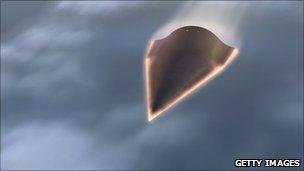US military loses contact with hypersonic aircraft
- Published

The HTV-2 is designed by engineers to travel at 13,000mph (21,000km/h)
US military scientists lost contact with an unmanned hypersonic experimental aircraft on its second test flight, officials said.
The Falcon Hypersonic Test Vehicle 2 (HTV-2) successfully separated from its rocket but lost contact shortly into its "glide phase".
The plane is designed to travel at Mach 20, or 20 times the speed of sound.
The Falcon project is part of the US defence department's plans to develop a rapid-strike weapons system.
A hypersonic plane could potentially enable the US military to hit targets anywhere in the world in under an hour.
Highly complex
The HTV-2 - shaped like the tip of a spear - took off atop a Minotaur IV rocket from Vanderberg Air Force Base in California early on Thursday.
It was propelled to the edges of space where it then separated from the rocket.
The aim by engineers was that it would glide back to Earth at 13,000mph (21,000km/h) - enduring temperatures in excess of 3,500F (2,000C) - before plunging into the Pacific Ocean.
The Defense Advanced Research Projects Agency (Darpa), which is funding the HTV-2 programme and overseeing the tests, said more than nine minutes of data was collected "before an anomaly caused loss of signal".
"Initial indications are that the aircraft impacted the Pacific Ocean along the planned flight path," Darpa said in a statement on its website.
An HTV-2 plane was first tested last year, and ended with the craft crashing into the Pacific after the military lost contact with the glider nine minutes into the flight.
However, the flight still managed to return 139 seconds of aerodynamic data at a velocity between 17 and 22 times the speed of sound, Darpa said.
"We know how to boost the aircraft to near space," Maj Chris Schulz, the programme manager, was quoted as saying on Darpa's website.
"We know how to insert the aircraft into atmospheric hypersonic flight. We do not yet know how to achieve the desired control during the aerodynamic phase of flight. It's vexing; I'm confident there is a solution. We have to find it."
Maj Shulz said a team of experts would now analyse the flight data and expand "our technical understanding of this incredibly harsh flight regime".
Some analysts say a second uncompleted flight could force Darpa to rethink the entire project, the BBC's Marcus George in Washington reports.